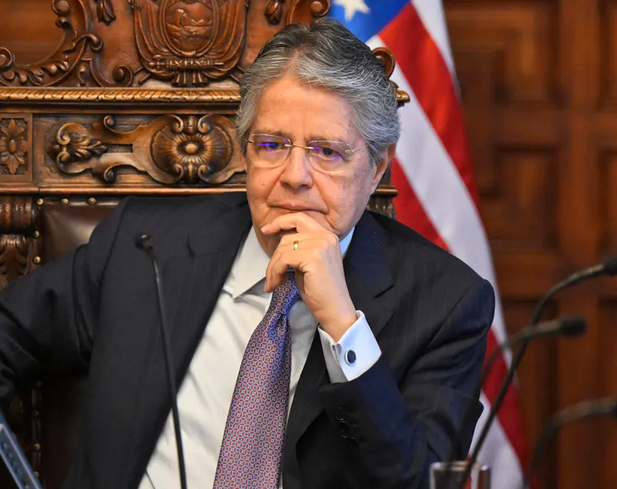Lasso’s impeachment trial is only the latest of the many crises facing Ecuador
By Ellen Ioanes
Ecuador’s National Assembly is on the verge of impeaching President Guillermo Lasso, whose administration is mired in allegations of corruption, including ties to organized crime, tax evasion, and corruption in the energy industry.
The potential impeachment comes as Ecuador faces increasing levels of violence and inequality under Lasso’s watch, which are arguably the greater driving forces behind the push to remove him from office, experts said. While the corruption allegations are serious and concerning, Lasso was deeply unpopular before those allegations gained traction, and for reasons that more intimately impact ordinary people’s lives.
It’s the second time that the National Assembly has attempted to remove Lasso from office since his term began in 2021. A previous attempt in June 2022 fell short of the 92 votes needed to end his presidency, motivated by “the serious political crisis and internal commotion” caused by weeks of protest against the increased cost of living and poverty in the South American nation.
Now, opposition lawmakers contend that Lasso is criminally negligent for failing to cancel a contract between FLOPEC, a state-run energy concern, and a private company, allowing the company to embezzle from FLOPEC. Lasso denies any wrongdoing.

President Guillermo Lasso attends a meeting with US Senators Bob Menendez and Tim Kaine at the Carondelet Palace in Quito on April 10.
In the face of his potential removal from power and what appears to be his diminishing control over the country, Lasso is attempting to shore up support from right-wing legislators and the Ecuadorean public, unsettled by the massive increase in drug-related crime in coastal cities, by projecting a tough-on-crime image.
These new policies could lay the groundwork for a crackdown should the impeachment outcome yield a popular uprising of the kind that generated last year’s impeachment proceedings, particularly given the potency and organizing power of CONAIE, the nation’s primary Indigenous rights organization.
Lasso has pursued neoliberal policies, like cutting fuel subsidies and deregulation in the oil and mining industries. “Lasso believes in the market, he’s a banker,” Carlos de la Torre, director of the University of Florida Center for Latin American Studies, said. “So of course, his economic policies are not great for the majority.”
Lasso’s market-first economic ideas have won him friends in the US but have contributed to his deep unpopularity in his own country. “Lasso’s popularity has never been above 20 percent,” Marc Becker, a professor of Latin American history at Truman State University, told Vox. “I’d call him a lame-duck president since he’s been elected; he’s never been able to do anything.” Becker adds that Lasso was elected only because of the even greater unpopularity of former President Rafael Correa who supported the opposing presidential candidate.
That unpopularity exploded into an uprising in June of 2022, driven primarily by CONAIE. Lasso initially slashed fuel subsidies as part of a loan agreement with the International Monetary Fund, and eased regulations on the mining and oil and gas industries in an effort to cut government spending and revive Ecuador’s economy, which had been sputtering since the mid-2010s.
Lasso’s policies pushed poor and Indigenous Ecuadorians to go on strike; a cut to fuel subsidies was untenable for people already struggling, and increased mining and petroleum extraction threatened Indigenous land.
“There is this perception that it is a government just for the rich, just for the bankers, just for the bourgeoisie, just for foreign capital,” de la Torre said. “And to an extent, it’s right, it’s true — that’s the priority of this government.”
The strikes and protests, which began June 13, lasted for two weeks until negotiations with the government brought them to an end. They had a massive impact on the country, shutting down traffic, cutting oil production in half, and sometimes turning violent in clashes with authorities.
“The Indigenous movement has the capacity to do this — to mobilize the communities, to take over the cities, and to do these long marches, or strikes, or occupation of public space, that can last for weeks because they literally come down from the mountains,” according to Guillaume Long, a senior policy analyst at the Center for Economic and Policy Research. “They come with their communities, they come with food, they come with the mentality that they’re going to have to survive there, sometimes for several days, sometimes for several weeks.”
In recent months, however, the unity of the indigenous movement has come into question, and it is not clear if another mass-scale strike is a near-term option. CONAIE President Leonidas Iza’s plan for national strike in February was rejected by many members of the CONAIE governing board.
The rapid escalation in drug gang violence at the country’s major ports under Lasso is also a major factor in his unpopularity. Ecuador became a major hub for drug smuggling and human trafficking after former President Correa allowed visa-free entry to Ecuador, but the extreme violence and proliferation of violent gangs have skyrocketed in the past five years, Long said.
“Every day there’s a massacre” in Ecuador, he said. “That’s everyday news in Ecuador, and that’s deeply shocking to Ecuadorians — that’s what lies, to a large extent, behind the lack of popularity of the current government.”
Though the Lasso government has made some superficial steps toward reducing crime, years of underfunding Ecuador’s police forces as well as the proliferation of drug trafficking and gang violence will take years to combat, Long said.
But the allegations against Lasso have brought condemnation from at least one American politician — Rep. Raúl Grijalva (D-AZ), who wrote a scathing letter to President Joe Biden urging him to rethink the US’s relationship with Ecuador.
“Ecuador is now in the midst of a political and social crisis that is driven, in large part, by credible allegations of corruption at the highest levels of government,” Grijalva wrote in his April 12 letter. “Investigative journalists have uncovered what appears to be a web of corruption that ties key associates of Ecuadorian President Guillermo Lasso to organized crime figures,” including the president’s brother-in-law and business associate Danilo Carrera. Gijalva’s letter also accuses Lasso and Carrera of “using U.S. jurisdictions to hide assets and avoid taxes, in violation of Ecuadorian law.”
The corruption allegations against Lasso could be the thing that brings him down in Ecuador, but it’s not clear how they’ll affect the country’s relationship with the US. Though a December 2022 visit between Lasso’s delegation and President Joe Biden appeared friendly, allegations of corruption that have surfaced since February have caused some discomfort, as evidenced by Grijalva’s letter. But, Becker explained, they’re unlikely to do long-term damage to the relationship. “The Biden administration remains very, very close to Lasso,” Becker said. “From my perspective, I’d say that says two things: One, it says the corporate nature of the Democratic party in the United States is ideologically aligned with Lasso’s neoliberal agenda. And the other thing I’d say is, over the last 250 years, I don’t see any significant variance in US policy toward Latin America.”
The Constitutional Court has given the National Assembly permission to pursue its impeachment case against Lasso, though a final hearing and vote will not happen before the end of May. Lasso’s efforts to gin up support among the public for his tough-on-crime policies are unlikely to be effective since those policies have yet to change the situation on the ground, if they can at all.
“Politically, Lasso’s government is increasingly isolated,” Long said. His party, CREO, has only a dozen seats in the National Assembly, though it has made a coalition with nine other parties. It also enjoys some support from the Pachakutik Plurinational Unity Movement, an Indigenous party that was once the political arm of CONAIE. It’s possible, then, that Lasso may garner enough support to save him from impeachment yet again, despite his unpopularity and political weakness.
Procedurally, if Lasso believes impeachment and his removal from office is imminent, he has the constitutional authority to dissolve the National Assembly and govern by decree until new elections are held. The scenario is called the “cross death.” Becker said some candidates appear to be preparing for such an event, in which Lasso has said he would also stand for reelection.
There’s the potential for another uprising if he isn’t voted out, both de la Torre and Long told Vox. Because the impeachment proceedings are based on corruption allegations and not Lasso’s harmful policies, he could stay in power without taking responsibility for the economic distress and brutal violence that many Ecuadorians are feeling.
From a financial standpoint, further instability, including Lasso’s departure, could affect the terms of the country’s economic situation. Ecuador has defaulted on its foreign debt 11 times, including a dramatic and volatile default under Correa in 2008 — a scenario that international investors aren’t eager to relive, and which could cut off Ecuador from external sources of funding.
Regardless of what happens with the impeachment vote, Becker said, Lasso’s legacy will be abysmal. “I think he’ll go down as being one of the most disastrous presidents in Ecuador’s recent history, and that’s saying something.”
_________________
Ellen Ioanes covers breaking and general assignment news as the weekend reporter at Vox. She’s been reporting on US politics and policy and foreign affairs since 2021, covering Russia’s war with Ukraine, US congressional policy, and South Asian politics, among other issues.



















